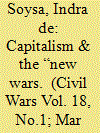|
|
|
Sort Order |
|
|
|
Items / Page
|
|
|
|
|
|
|
| Srl | Item |
| 1 |
ID:
145026


|
|
|
|
|
| Summary/Abstract |
Critics of globalisation suggest that growing free-market conditions generate anomie, leading ultimately to what some term ‘new wars’ and new insecurities. Others argue that liberal economies dissuade violence since people gain from peace. This study argues for a micro perspective that views predatory economic policies driving higher investment in rebellion-specific capital, such as shadow economic activity that easily translates into insurgency in weak-state settings. Investment in the shadows determines survivability against superior state forces, and survivability determines rebellion, by definition. Using civil war onset data from 1970 to 2013, as well as the Global Peace Index (GPI) and several of its individual components, which capture societal insecurity above and beyond the absence of armed violence, this study finds that countries that are more capitalistic have a lower risk of civil war and societal insecurity. The results are robust to alternative models, testing methods, and uphold when examining several relevant subcomponents of the index, such as internal conflict, violent crime, homicides, ease of access to small arms, and political instability. Surprisingly, democracy tends not to be associated with peace but associates with increased criminality whereas strong autocracy reduces it, suggesting that capitalism, more than democracy, associates with conditions favourable to societal security, independently of a country’s level of development.
|
|
|
|
|
|
|
|
|
|
|
|
|
|
|
|
| 2 |
ID:
179955


|
|
|
|
|
| Summary/Abstract |
The escalated violent conflicts and political upheavals in many developing countries have emphasized the pertinence of examining the multifaceted nature of conflict, and the various strategies that bring about reasonable degrees of peace. This paper examines the effects of national economic and socio-economic factors on national peace level, and on the corresponding elementary indicators. The empirical analysis is implemented through a panel dataset, using different econometric methodologies. The basic results underline that countries characterized by higher economic development levels, open trade systems, more educated population, and democratic systems rest on higher national peace levels. Meanwhile, countries that experience higher levels of income inequality and that are endowed with natural resources tend to be less peaceful. Also, the positive impacts of international alliances/regional blocs on national peace are mainly expressed through their promoting economic effects rather than through their aggression-deterrence properties. The empirical analysis shows that the effects of national economic and socio-economic factors on the elementary indicators exhibit considerable variations in magnitude and significance. Hence, an exclusive examination of the effects of these variables on the overall peace index would conceal significant differences across the elementary indicators, which should be accounted for when analyzing national peace and developing peace-promoting strategies.
|
|
|
|
|
|
|
|
|
|
|
|
|
|
|
|
| 3 |
ID:
123855


|
|
|
|
|
|
|
|